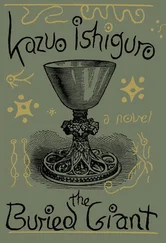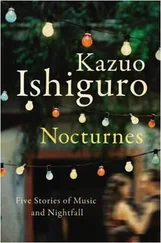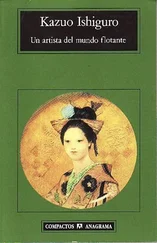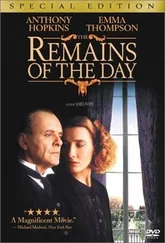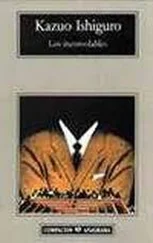For a moment they were both looking at me. Then Madame said, barely audibly:
“Poor creatures. What did we do to you? With all our schemes and plans?” She let that hang, and I thought I could see tears in her eyes again. Then she turned to me and asked: “Do we continue with this talk? You wish to go on?”
It was when she said this that the vague idea I’d had before became something more substantial. “Do I go too far?” And now: “Do we continue?” I realised, with a little chill, that these questions had never been for me, or for Tommy, but for someone else—someone listening behind us in the darkened half of the room.
I turned round quite slowly and looked into the darkness. I couldn’t see anything, but I heard a sound, a mechanical one, surprisingly far away—the house seemed to go much further back into the dark than I’d guessed. Then I could make out a shape moving towards us, and a woman’s voice said: “Yes, Marie-Claude. Let us carry on.”
I was still looking into the darkness when I heard Madame let out a kind of snort, and she came striding past us and on into the dark. Then there were more mechanical sounds, and Madame emerged pushing a figure in a wheelchair. She passed between us again, and for a moment longer, because Madame’s back was blocking the view, I couldn’t see the person in the wheelchair. But then Madame steered it around to face us and said:
“You speak to them. It’s you they’ve come to speak to.”
“I suppose it is.”
The figure in the wheelchair was frail and contorted, and it was the voice more than anything that helped me recognise her.
“Miss Emily,” Tommy said, quite softly.
“You speak to them,” Madame said, as though washing her hands of everything. But she remained standing behind the wheelchair, her eyes blazing towards us.
“Marie-Claude is correct,” Miss Emily said. “I’m the one to whom you should be speaking. Marie-Claude worked hard for our project. And the way it all ended has left her feeling somewhat disillusioned. As for myself, whatever the disappointments, I don’t feel so badly about it. I think what we achieved merits some respect. Look at the two of you. You’ve turned out well. I’m sure you have much you could tell me to make me proud. What did you say your names were? No, no, wait. I think I shall remember. You’re the boy with the bad temper. A bad temper, but a big heart. Tommy. Am I right? And you, of course, are Kathy H. You’ve done well as a carer. We’ve heard a lot about you. I remember, you see. I dare say I can remember you all.”
“What good does it do you or them?” Madame asked, then strode away from the wheelchair, past the two of us and into the darkness, for all I know to occupy the space Miss Emily had been in before.
“Miss Emily,” I said, “it’s very nice to see you again.”
“How kind of you to say so. I recognised you, but you may well not have recognised me. In fact, Kathy H., once not so long ago, I passed you sitting on that bench out there, and you certainly didn’t recognise me then. You glanced at George, the big Nigerian man pushing me. Oh yes, you had quite a good look at him, and he at you. I didn’t say a word, and you didn’t know it was me. But tonight, in context, as it were, we know each other. You both look rather shocked at the sight of me. I’ve not been well recently, but I’m hoping this contraption isn’t a permanent fixture. Unfortunately, my dears, I won’t be able to entertain you for as long as I’d like just now, because in a short while some men are coming to take away my bedside cabinet. It’s a quite wonderful object. George has put protective padding around it, but I’ve insisted I’ll accompany it myself all the same. You never know with these men. They handle it roughly, hurl it around their vehicle, then their employer claims it was like that from the start. It happened to us before, so this time, I’ve insisted on going along with it. It’s a beautiful object, I had it with me at Hailsham, so I’m determined to get a fair price. So when they come, I’m afraid that’s when I shall have to leave you. But I can see, my dears, you’ve come on a mission close to your hearts. I must say, it does cheer me to see you. And it cheers Marie-Claude too, even though you’d never know it to look at her. Isn’t that so, darling? Oh, she pretends it’s not so, but it is. She’s touched that you’ve come to find us. Oh, she’s in a sulk, ignore her, students, ignore her. Now, I’ll try and answer your questions the best I can. I’ve heard this rumour countless times. When we still had Hailsham, we’d get two or three couples each year, trying to get in to talk to us. One even wrote to us. I suppose it’s not so hard to find a large estate like that if you mean to break the rules. So you see, it’s been there, this rumour, from long before your time.”
She stopped, so I said: “What we want to know now, Miss Emily, is if the rumour’s true or not.”
She went on gazing at us for a moment, then took a deep breath. “Within Hailsham itself, whenever this talk started up, I made sure to stamp it out good and proper. But as for what students said after they’d left us, what could I do? In the end, I came to believe—and Marie-Claude believes this too, don’t you, darling?—I came to believe that this rumour, it’s not just a single rumour. What I mean is, I think it’s one that gets created from scratch over and over. You go to the source, stamp it out, you’ll not stop it starting again elsewhere. I came to this conclusion and ceased to worry about it. Marie-Claude never did worry about it. Her view was: ‘If they’re so foolish, let them believe it.’ Oh yes, don’t show me that sour face of yours. That’s been your view of it from the beginning. After many years of it, I came not exactly to the same viewpoint. But I began to think, well, perhaps I shouldn’t worry. It’s not my doing, after all. And for the few couples who get disappointed, the rest will never put it to the test anyway. It’s something for them to dream about, a little fantasy. What harm is there? But for the two of you, I can see this doesn’t apply. You are serious. You’ve thought carefully. You’ve hoped carefully. For students like you, I do feel regret. It gives me no pleasure at all to disappoint you. But there it is.”
I didn’t want to look at Tommy. I felt surprisingly calm, and even though Miss Emily’s words should have crushed us, there was an aspect to them that implied something further, something being held back, that suggested we hadn’t yet got to the bottom of things. There was even the possibility she wasn’t telling the truth. So I asked:
“Is it the case, then, that deferrals don’t exist? There’s nothing you can do?”
She shook her head slowly from side to side. “There’s no truth in the rumour. I’m sorry. I truly am.”
Suddenly Tommy asked: “Was it true once though? Before Hailsham closed?”
Miss Emily went on shaking her head. “It was never true. Even before the Morningdale scandal, even back when Hailsham was considered a shining beacon, an example of how we might move to a more humane and better way of doing things, even then, it wasn’t true. It’s best to be clear about this. A wishful rumour. That’s all it ever was. Oh dear, is that the men come for the cabinet?”
The doorbell had gone, and footsteps came down the stairs to answer it. There were men’s voices out in the narrow hall, and Madame came out of the darkness behind us, crossed the room and went out. Miss Emily leaned forward in the wheelchair, listening intently. Then she said:
“It’s not them. It’s that awful man from the decorating com-pany again. Marie-Claude will see to it. So, my dears, we have a few minutes more. Was there something else you wished to talk to me about? This is all strictly against regulations, of course, and Marie-Claude should never have asked you in. And naturally, I should have turned you out the second I knew you were here. But Marie-Claude doesn’t care much for their regulations these days, and I must say, neither do I. So if you wish to stay a little longer, you’re very welcome.”
Читать дальше

